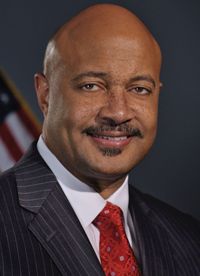By CURTIS HILL
Indiana Attorney General
 Too often, the term “criminal justice reform” has been synonymous with reducing penalties for criminal behavior.
Too often, the term “criminal justice reform” has been synonymous with reducing penalties for criminal behavior.
The idea that in America we lock up too many people has resulted in some states, including Indiana, reducing penalties on criminals. We have seen states, including Indiana, repeal mandatory minimum sentences for drug dealers; and we have seen states, including Indiana, reduce penalties for those trafficking in such deadly and destructive drugs as heroin, cocaine and methamphetamine.
While it is truly painful to see people locked away in prison rather than leading productive lives, we also must recognize that a very small percentage of people commit the large majority of crime in any particular community.
To protect law-abiding citizens, then, we must recognize two types of criminals that ought to be considered for lockup: Violent offenders and chronic offenders. Violent offenders are those who commit crimes such as murder, rape, child molesting, armed robbery – crimes so counter to our collective well-being that few would dispute the necessity for substantial incarceration. Chronic offenders are those who – although their deeds might be less shocking – continue to commit crime after crime after crime. Simply put, the only way to stop them from committing more crime is to get them off the streets.
The White House understands these realities, and its version of criminal justice reform – or “prison reform,” as it is more commonly called – is something much superior to previous proposals. During a gathering at the White House a few months ago, I observed firsthand the President’s approach to reforming our prisons without going soft on crime. We can and must insist that offenders are provided genuine and meaningful opportunities to turn their lives around and break the cycles that lead them repeatedly into criminal behavior.
As Indiana’s attorney general, I have championed jail chemical addiction programs – or JCAP, as we call it. For criminal offenders with addiction problems, incarceration can be a godsend if it helps put them on the road to recovery. The key is connecting them with quality long-term treatment programs that begin during incarceration and continue well beyond their release.
We cannot just give lip service to these ideas. I believe in the benefits of prison reform, and toward that end, my office is leading the effort to help start JCAP programs in counties across the state. On Aug. 22, I announced that Kosciusko County in northern Indiana would receive an $87,800 JCAP grant from the Indiana Drug Enforcement Association – an award made possible through seed funding from my office.
The best correctional models are those that hold offenders accountable for their crimes but that also help improve their character by addressing social, emotional, spiritual, educational and familial issues through targeted services. JCAP is one model that puts this truth into practice.
Besides offering quality substance abuse treatment programs, we need to better provide other services to inmates such as education, job training and mental health services. We also should explore incentives for employers willing to provide a second chance to job applicants with criminal histories.
Read more about President Trump’s prison reform agenda at this link.
While it is of critical importance to develop these programs, we also cannot forget that people still need to be held accountable to the law. As President Trump stated, “In this effort, we are not absolving prisoners of their central role in their own rehabilitation. There is no substitute for personal accountability, and there is no tolerance for those who take advantage of society’s generosity to prey upon the innocent. However, if we want more prisoners to take charge of their own lives, then we should work to give them the tools to stand on their own two feet.”
In the words of Vice President Mike Pence, “Changed hearts means changed lives.”
We must work together as Americans and as Hoosiers to see that these opportunities are provided. Unlike provisions that focus on softer penalties for drug dealers and other criminals, prison reform is an area in which people of all political persuasions should be able to come together on common ground to do great things. I urge members of Congress to support President Trump’s vision for meaningful prison reform.
